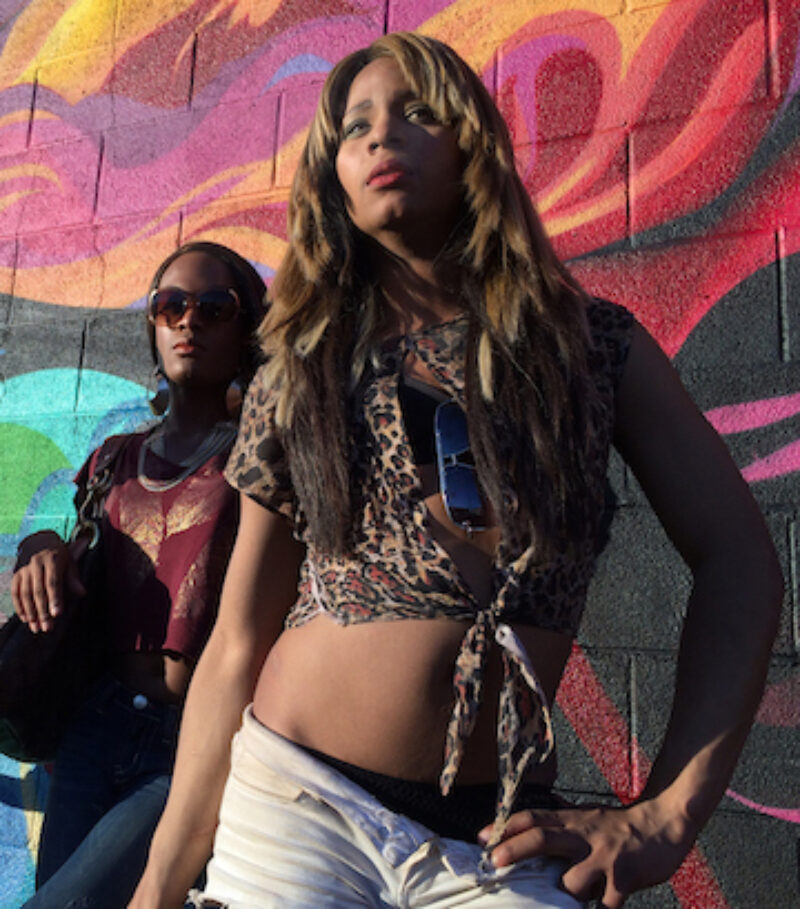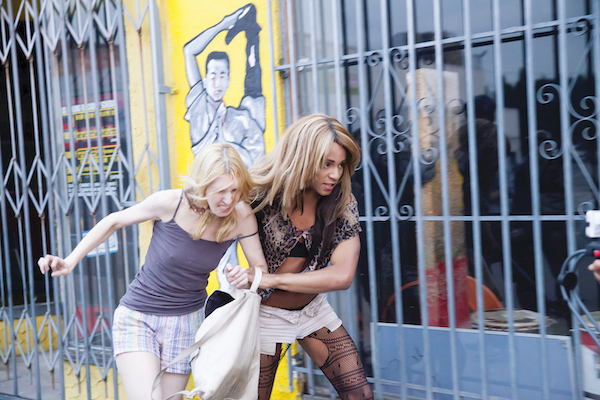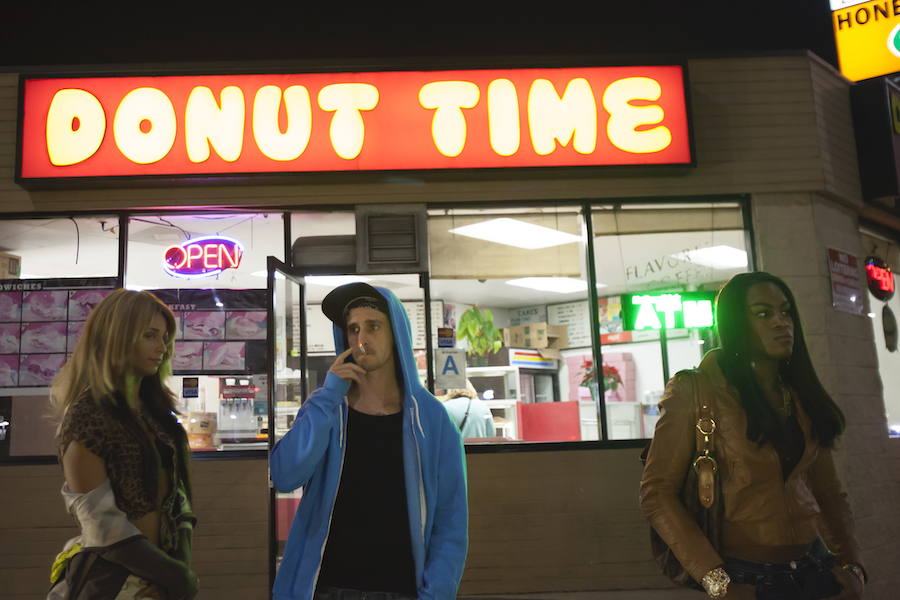Tangerine: A Powerful Picture of Black Trans Lives
Review of Tangerine at Northwest Film Forum
Written by TeenTix Newsroom Writer Taylar Christianson and edited by Teen Editor Kendall Kieras

The world of Tangerine starts in a donut shop. It’s Christmas Eve in L.A., and Sin-Dee Rella has just been released from a month in prison, only to discover her boyfriend, Chester, has been cheating on her in the short time she’s been gone. Sin-Dee and her best friend, Alexandra, set off on a vibrant and emotional journey through West Hollywood, looking for revenge on Chester and his side piece—if they can find them.
Directed by Sean Baker (most recently known for The Florida Project), Tangerine is a hilarious and emotionally resonant buddy comedy about the lives of two Black transgender sex workers. Famously filmed on an iPhone 5S, the film creates a beautiful, saturated world populated by an authentic and talented cast, including first-time actors Kitana Kiki Rodriguez and Mya Taylor as Sin-Dee and Alexandra. Both Rodriguez and Taylor contributed hugely to the story and tone of Tangerine, informing the film with their experiences as Black trans women and their knowledge of L.A.’s sex work community. Tangerine’s main plot is inspired by a conversation overheard by Rodriguez about a trans woman whose boyfriend cheated on her with a cisgender woman, or a “fish”, while she was in prison. During the movie’s development, Rodriguez made a particular request of Baker: to “show the harsh reality of what goes on out here… I want you to make it hilarious and entertaining for us and the women who are actually working the corner.” Baker credited Rodriguez for changing his original vision of a bleak drama into something “that would present these characters to mainstream audiences in a pop culture way, so that they could identify with them.”

A comedy about getting revenge on a cheating ex might sound like one that pits women as enemies, and you’d be partially right—when Sin-Dee finally finds Dinah, the much-discussed fish, she drags Dinah around L.A. on a trip to confront Chester. But first, she takes Dinah to support Alexandra’s cabaret performance at a local club where, despite Alexandra’s advertising, they are the only audience members. It’s one of many genuine moments that deeply anchor the film in Alexandra and Sin-Dee’s friendship. Even through their fights and betrayals, they stick together—it’s them against the neighborhood, and more broadly, the social systems and prejudices that devalue them.
Though the Black trans sex workers at the center of Tangerine are a large and familiar presence in their community, the film never loses its sense of the risk and alienation that permeates their lives. Sin-Dee and Alexandra are often shown walking through busy L.A. streets, where the contrast between their gender presentation and the surrounding cisgender crowd is heightened, and throughout the film, they are objectified and insulted by clients, harassed by cars full of strangers, and misgendered and dehumanized by police officers. Tangerine doesn’t—and shouldn’t—let the viewer forget that Black trans women constantly face discrimination and violence in their daily lives, and are targeted specifically for their Black, female, and trans identities. In particular, sex workers like Sin-Dee and Alexandra experience a cocktail of misogyny, transmisogyny, and stigma against sex work, leading to higher murder rates and greater likelihood of being unfairly arrested and jailed. And for many Black trans women, sex work is one of their only viable options: Black transgender people in the U.S. have far-above-average rates of unemployment and poverty, increasing their chances of homelessness and their vulnerability in almost every area of their lives.

Between Black Lives Matter protests in every state, an ongoing pandemic, the stripping of healthcare protections for trans Americans, and whatever J.K. Rowling is trying to add to the conversation, this Pride month has been eventful. Since George Floyd’s death in May, the systemic discrimination and violence that Black Americans face has become a nationwide conversation, and it’s an issue that particularly affects Black trans women, whose racial oppression is compounded by their gender identities. In the last few weeks alone, Riah Milton and Dominique “Rem’mie” Fells were murdered for existing while Black and trans. Last year, no investigation was made into the death of Tete Gulley, a Black trans woman killed in Portland, because of “lack of public interest.” In the U.S. and around the world, the violent deaths of Black trans women are seen as commonplace, swept under the rug and forgotten—not important or human enough to be remembered.
Tangerine is an important watch this Pride (or anytime) not just for its place in the LGBT Movies listicles, but because it’s an open and beautiful portrayal of two Black trans women and the world they live in, without judgement or sensationalization. Watch Tangerine—but also donate, protest, and amplify the voices of Black and trans people. Take a note from the unofficial slogan of Transgender Day of Remembrance, and give Black trans women their roses while they’re still here.
Tangerine is currently available to watch on the Northwest Film Forum website. For more information see here.
Lead photo credit: Kitana Kiki Rodriguez in Tangerine, a Magnolia Pictures release. Photo courtesy of Magnolia Pictures.
The TeenTix Newsroom is a group of teen writers led by the Teen Editorial Staff. For each review, Newsroom writers work individually with a teen editor to polish their writing for publication. The Teen Editorial Staff is made up of 6 teens who curate the review portion of the TeenTix blog. More information about the Teen Editorial Staff can be found HERE.
The TeenTix Press Corps promotes critical thinking, communication, and information literacy through criticism and journalism practice for teens. For more information about the Press Corps program see HERE.


